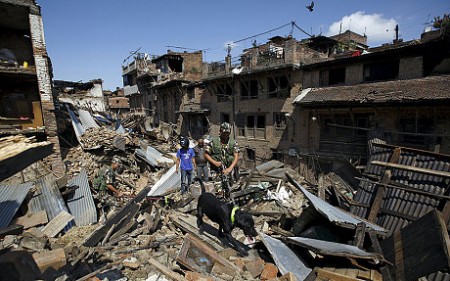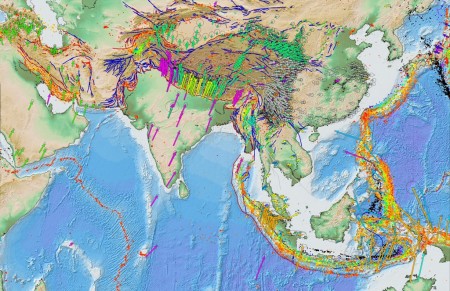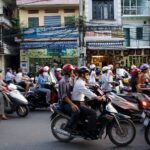April 27, 2015 – It has been described as a tragedy waiting to happen by CNN. That seismologists and earth scientists knew it was coming.
The earthquake that struck Nepal in the last weekend had a magnitude of between 7.8 and 7.9 on the Richter scale depending on different reports. So far the dead count is approaching 4,000 and climbing. A week before it struck 50 scientists visited Kathmandu to discuss how to prepare the city for a potential earthquake of this magnitude. What they didn’t foresee was the coincidence of their visit with the event that followed.
Nepal is a perfect earthquake zone say scientists. In the world of plate tectonics, over the last 10 million years Eurasia and India have been grinding against each other along a 2,900 kilometers (approximately 1,500 miles) front with India pushing up the Himalaya Mountains a centimeter (0.4 inches) per year. In the map image below we can the force and direction of the Indian plate using 1,867 ground-based sensors tracked by GPS satellites. This motion averages 2.5 centimeters (approximately 1 inch) annually along some of the segments.
By plate tectonic motion standards this is considered pretty significant. In fact the Indian plate which broke off from Madagascar some 90 million years ago seems to be the record holder for plate tectonic speeds.
So if we know this why can’t we forecast an impending earthquake? After all the scientists who gathered in Kathmandu the week before the earthquake were confident that at some point one would occur. They were confident because the area has experienced on average magnitude-8 earthquakes approximately every 75 years. The last one was in 1934, 81 years ago. Yet this one happened without any means of us detecting it beforehand.
Today the science of earthquake detection remains primitive. We can detect plate movements using technologies like GPS, laser altimeters fired from satellites, and sensors placed on the ground. We have seismometers that may pick up early evidence of a major earthquake. And we can use radon sensors along a seismic fault to measure escaping gas. But with all that we cannot predict when an earthquake will strike and the energy it will unleash. We remain in the dark.
What we can do where we have dense populations living in prone areas is design and construct buildings that can absorb the energy and motion of an earthquake. In Kathmandu, sadly, that was not the case. The ancient city infrastructure was incapable of handling the earth shaking event even though Kathmandu and the government of Nepal had revised building codes in the last couple of decades to ensure new buildings were earthquake proof.
The real challenge, other than trying to predict an earthquake, is to get governments to act in earthquake prone areas in the best interests of their citizens. That means investing in infrastructure and buildings, from homes to offices, that are up to code. Poverty however is a great inhibitor to such noble pursuits.
And so the death toll in Kathmandu will rise as rescuers go through the rubble of the city and its surroundings. And as certain as day follows night, when Kathmandu rebuilds it will not be any better off in its ability to withstand a future earthquake because it will not have the financial means to address the problem.
James Jackson, head of the Earth Sciences Department, University of Cambridge, England, was one of those scientists visiting Kathmandu a week before the earthquake. He points out that living in this part of Nepal comes with many other challenges. In an Associated Press report he states,
“If you live in the Kathmandu Valley you have other priorities, daily threats and daily nasty things happen to you in terms of air quality, water quality, pollution, traffic and just poverty…..But it doesn’t mean that the earthquakes go away.”















